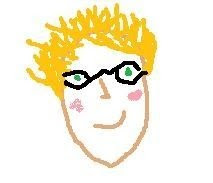
Movie poster image courtesy of WikiMedia and Skier Dude
********************************************************
F. Scott Fitzgerald asserted several decades ago that the rich are different. Sadly, so too, are "The Literati" or any who fancy themselves to be in that set of society. I've worked on a professional level with people in academia, people in the medical profession, people in publishing and authors. Authors win in terms of largest and most fragile egos.
The source of the film's eponymous title, of course, is poet and author Sylvia Plath. As Woody Allen wryly observes in his Academy-Award winning film, "Annie Hall", Plath was an "interesting poetess whose tragic suicide was misinterpreted as romantic by the college girl mentality". There was a great deal more to the late Ms. Plath than that, although I'm not sure how deeply this film bothers to delve.
When the film opens, Plath has already arrived at Cambridge in the UK on a Fulbright Scholarship, after her undergraduate graduation from Smith College in the United States. It is here she meets Ted Hughes, a fellow poet, whom she weds. The visuals in this part of the film are stunning. As Plath, Gwyneth Paltrow, her hair styled in a 1950's page boy, and dressed in shades of pinks, reds, and russets, is lovely. (Note to Ms. Paltrow: perhaps you'd consider adopting some elements of this costuming into your offscreen persona. The raccoon eyes, gladiator sandals and serviette-short skirts really do not accent your natural loveliness. Just a thought.) Daniel Craig as Ted Hughes is really quite unrecognizable as the same guy who was James Bond in Casino Royale. His somewhat foppish mop of dark hair actually makes him look older than a graduate student, but he manages to convey well a certain degree of intensity you'd expect from the man who's about to become the Poet Laureate of the United Kingdom.
Plath and Hughes at Cambridge are seen as a subset within a group of "gonzo poets" for lack of a better term. Hughes tells Plath early in their courtship that poetry is not "like magic, it is magic". Plath, basking in the glow of his narcissim, continues to write her own work, but also edits, types and mails off Hughes' poetry. Plath also reveals her undergraduate suicide attempt details to Hughes when he asks about a small inconspicuous scar she has. When he wins a writing contest (into which Plath entered his work), he decides they should marry. They do and then move to America for a couple of years. Meeting Sylvia's mother (portrayed deftly by Blythe Danner, Paltrow's real-life mother), Hughes manages to hold his own. Sylvia and Ted rent a cottage for the summer, and Plath is plagued there by writer's block, channeling her energy instead into baking. Settling back in Boston, where they both have teaching positions, Plath seems beleaguered by her teaching responsibilities, her attempts to be a good homemaker, her aspirations as a writer, and her suspicious nature in regard to "admirers" of her husband, particularly his attractive female students. With the realization that things aren't working out, Hughes suggests they move back to England.
Not long after their arrival, Sylvia learns she's pregnant and gives birth to Frieda, while Hughes continues to enjoy great success as both a writer and a philanderer. The end of the marriage and sudden burst of inspiration for Sylvia's writing come with the revelation that Assia Wevill, a married friend, is pregnant by Hughes. The whole era seems to be one in which Plath, who'd given birth to a son prior to the end of her marriage, is possessed by an almost maniacal ability to write well and prolifically.
The film is controversial for a number of reasons. Both Jillian Becker (who was Plath's best friend) and Frieda Hughes (Plath's daughter and the executor of all of Plath's literary assets) felt this film was not worthy of their cooperation. The film does unabashedly take literary license with certain events--for example, Plath's mother actually did attend her daughter's wedding in England, and did not meet her son-in-law, as the film depicts, after the newlyweds' arrival in America.
One cannot help but think Plath was a woman, in many ways, decades ahead of her time. She subordinated her talent (consciously or not) to her husband's needs and ambitions. Her obvious mental illness would today be interpreted as a chemical imbalance in her brain and be treated as such. And her genius would touch us, perhaps in different ways. Having said that, the acting in this film was highly capable, and if you don't mind overtones that could be depressing, this film is for you.
